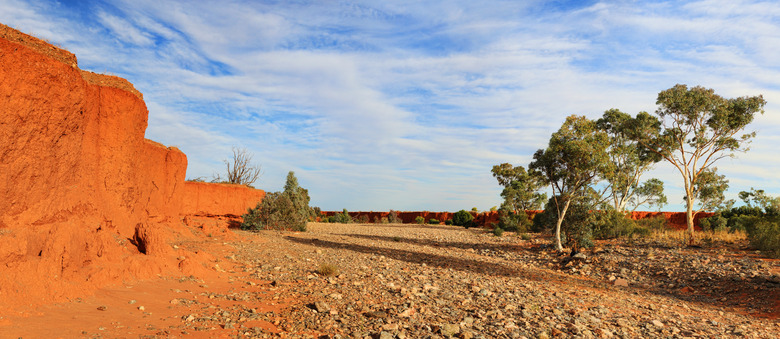How Does Climate Affect The Rate Of Weathering?
Climate plays a definitive role in the breakdown of rocks into soils and sediment, a process known as weathering. Rocks found in equatorial climates and exposed to lots of rain, humidity and heat break down or weather faster than similar rocks do when located in areas of the world with dry and cold climates.
TL;DR (Too Long; Didn't Read)
A region's climate plays a significant role in the rate of weathering. The climate of tropical rainforests plays havoc with rocks, rapidly breaking them into soils and sediment through repeated exposure to heat and copious amounts of rainfall. A haboob — a violent desert dust storm — sandblasts rocks into fine particles of sand, but not as fast as the rate of weathering that occurs in tropical climates.
Chemical, Physical and Biological Weathering
Chemical, Physical
and Biological Weathering
Weathering occurs one of three ways: through physical processes such as freezing and thawing, because of live organisms whose roots break rocks or through chemical processes that occur when carbon dioxide in the soil and air and mixes with water and specific minerals in rocks to form a weak acid that reduces rocks into silt, soil and sediment.
Chemical weathering typically increases as temperatures rise and rain falls, which means rocks in hot and wet climates experience faster rates of chemical weathering than do rocks in cold, dry climates.
Physical weathering occurs more often in cold climates, because the different minerals within rocks expand and contract at different rates when they are heated and cooled. Repeated heating and cooling cycles eventually cause rocks to fracture. Desert and mountain climates experience a wide range of temperatures from low to high during a day and night, which accounts for the breakdown of rocks known as physical weathering.
Biological weathering occurs when living organisms break up rocks. Tree roots, for example, can fracture rocks in the same way they buckle pavement. Warm, humid climates are most favorable to life. Contrast the rich diversity of life in a rainforest, for example, with the scarcity of life in the dry Sahara or the frigid Antarctic. Consequently, rates of biological weathering are most rapid in warm humid climates like those in tropical regions.
Climate Affects Weathering
Climate
Affects Weathering
Average temperatures, precipitation, wind and sun over the course of a year define a region's seasonal weather patterns known as climate. Some types of rocks weather more rapidly in humid climates, while dry climates make other rocks more susceptible to attack. Limestone weathers rapidly in areas with wet climates, where rainwater mixed with carbon dioxide in soil or creates a weak acid that dissolves the limestone to form crevices and valleys. Sandstone, by contrast, weathers more rapidly in dry climates, because the quartz in the sandstone is largely invulnerable to chemical weathering but can fall prey to fracturing caused by ice formed when water freezes and expands in cracks in the stone.
Wet vs. Dry Climates
Wet vs. Dry
Climates
Wet climates accelerate the rates of chemical weathering, caused when C02 in dirt mixes with air and water to form a weak acid. The weak acid breaks down rocks more rapidly in wet climates compared with dry ones. The mineral olivine, for example, is relatively unstable and vulnerable to chemical attack, so olivine-rich rocks break down much more rapidly in a humid region. In general, hot wet climates accelerate chemical weathering while cold dry climates accelerate physical weathering. Although the rate of weathering depends on the type of rock, rocks in tropical climates experience the highest rates of weathering because of the combination of high heat and heavy rainfall.
Cite This Article
MLA
Brennan, John. "How Does Climate Affect The Rate Of Weathering?" sciencing.com, https://www.sciencing.com/climate-affect-rate-weathering-22924/. 20 April 2018.
APA
Brennan, John. (2018, April 20). How Does Climate Affect The Rate Of Weathering?. sciencing.com. Retrieved from https://www.sciencing.com/climate-affect-rate-weathering-22924/
Chicago
Brennan, John. How Does Climate Affect The Rate Of Weathering? last modified March 24, 2022. https://www.sciencing.com/climate-affect-rate-weathering-22924/
